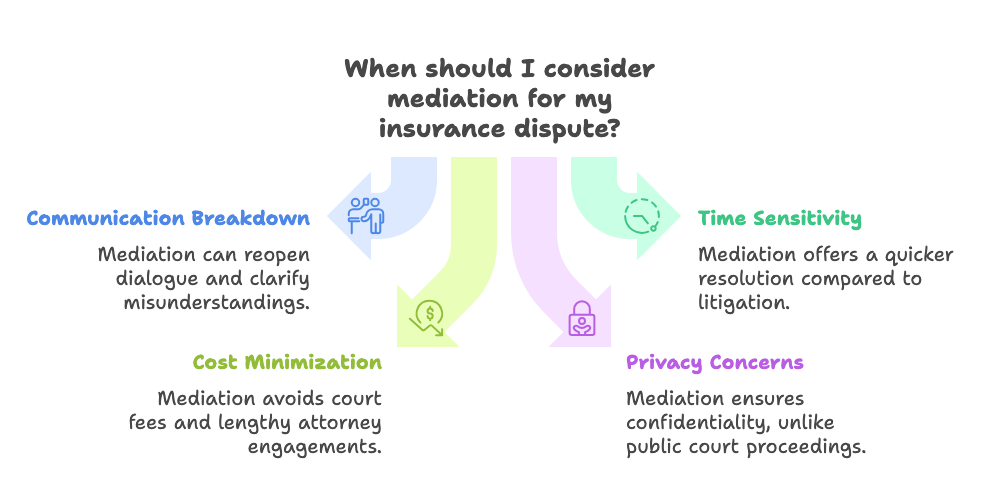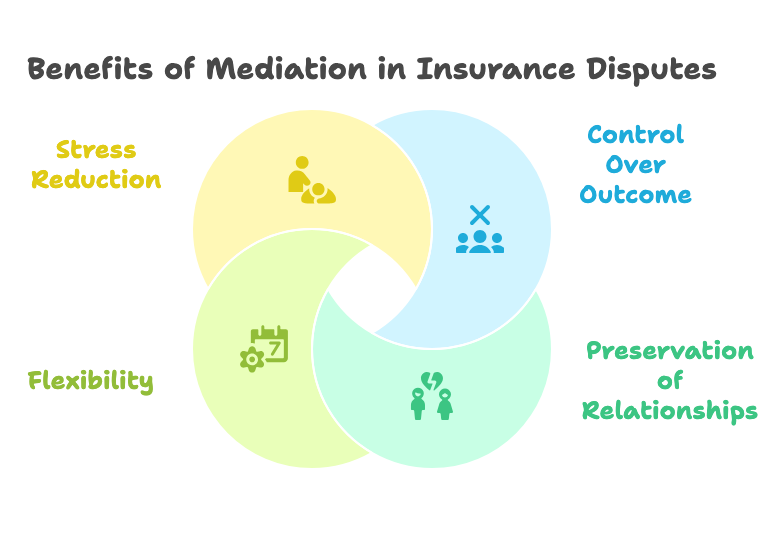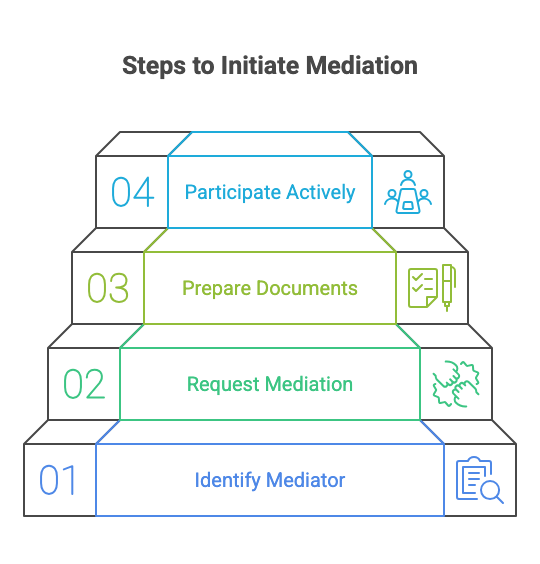Insurance conflicts can drain time, energy, and resources—especially when communication with your insurer breaks down or the claims process stalls. In many cases, Insurance Claim Mediation offers a far more efficient and collaborative alternative to drawn-out litigation. At Gables Medical Review, we specialize in guiding policyholders through effective dispute mediation, helping resolve claim disagreements quickly, fairly, and with significantly less stress.
If you’re facing unresolved insurance conflicts, it’s worth considering when mediation makes sense and how you can use it to your advantage. This blog outlines specific scenarios where mediation is most effective, along with concise advice for getting started.
Understanding Insurance Claim Mediation
Mediation is a voluntary, non-binding process where a neutral third party (the mediator) helps both parties reach an agreement. Unlike arbitration or court, the mediator doesn’t issue a ruling—they facilitate discussion, clarify misunderstandings, and promote cooperation.
With Insurance Claim Mediation, we focus on helping both policyholders and insurers find common ground without the need for expensive, time-consuming lawsuits.
The Role of the Mediator
The mediator acts as a facilitator, ensuring that both sides are heard and understood. They help identify the underlying issues, clarify misunderstandings, and explore potential solutions. The mediator remains impartial, focusing on fostering cooperation and guiding the parties towards a resolution that satisfies both parties.
When to Consider Mediation for Your Insurance Dispute

When to Consider Mediation for Your Insurance Dispute
Choosing mediation over litigation can be advantageous in several scenarios. Understanding when to opt for mediation can save you time, money, and emotional energy. Here are some situations where mediation can be particularly beneficial:
1. When Communication Has Broken Down
Insurance disputes often arise from misunderstandings or miscommunications. If you find that discussions with your insurer have reached an impasse, mediation can help reopen lines of communication. The mediator can assist in navigating complex insurance jargon and facilitate clearer dialogue, increasing the chances of reaching an agreement.
2. When Time is of the Essence
Litigation can be a lengthy process, often taking months or even years to resolve. In contrast, mediation is generally quicker, allowing parties to reach a resolution in a matter of weeks. If you need a swift resolution to your insurance claim dispute, mediation can be an ideal choice.
3. When Costs Need to be Minimized
Legal battles are expensive. With Insurance Claim Mediation, you avoid court fees and long attorney engagements. It’s a smart solution for anyone seeking a budget-friendly, yet fair resolution process.
4. When Privacy is a Priority
Unlike court proceedings, which are public, mediation sessions are confidential. This privacy can be crucial for both parties, especially when sensitive information is involved. If maintaining confidentiality is important to you, mediation offers a discrete avenue for resolving disputes.
The Advantages of Mediation
Mediation offers numerous benefits that make it an attractive option for resolving insurance claim disputes. Here are some of the key advantages:

Benefits of Mediation in Insurance Disputes
- Control Over the Outcome: Unlike litigation, where a judge or jury decides the outcome, mediation allows the parties to control the resolution. This collaborative approach often results in more satisfactory outcomes for both parties.
- Preservation of Relationships: Mediation fosters cooperation and can help preserve professional relationships. This is particularly beneficial in ongoing insurance relationships where maintaining a positive rapport is essential.
- Flexibility: Mediation offers flexibility in terms of scheduling and process. Parties can tailor the mediation to suit their specific needs and timelines.
- Stress Reduction: The informal and cooperative nature of mediation can significantly reduce the stress associated with insurance disputes, providing a more supportive environment for resolution.
Steps to Initiate Mediation
If you decide that mediation is the right course for your insurance dispute, here are the steps to initiate the process:

Steps to Initiate Mediation
- Identify a Qualified Mediator: Research and select a mediator with experience in insurance disputes. Their expertise can be invaluable in navigating the complexities of your case.
- Request Mediation: Contact your insurance company and propose mediation as a means to resolve the dispute. Many insurers are open to mediation as a cost-effective and efficient alternative to litigation.
- Prepare for Mediation: Gather all relevant documentation, including policy details, correspondence, and any evidence supporting your claim. Being well-prepared can facilitate a smoother mediation process.
- Participate in the Mediation Session: Engage actively in the session, keeping an open mind and being willing to compromise. The goal is to reach a mutually acceptable resolution.
Potential Challenges in Mediation
While mediation offers numerous benefits, it’s important to acknowledge potential challenges that may arise during the process:
- Imbalance of Power: In some cases, one party may hold more power or resources, potentially influencing the mediation process. A skilled mediator can help address and balance these dynamics.
- Partial Resolutions: Mediation may not result in a complete resolution of all issues. In such cases, parties may need to pursue additional negotiations or legal action.
- Lack of Binding Agreement: Since mediation is non-binding, parties are not obligated to accept the outcome. However, this flexibility can also be a strength, allowing for creative solutions.
Read: Why Mediation Services Are Key to Resolving Insurance Claim Disputes
If you’re stuck in an unresolved claim and looking for a faster, more affordable, and collaborative option, Insurance Claim Mediation may be exactly what you need. Whether you’re dealing with delayed settlements, unclear policy language, or uncooperative insurers, dispute mediation offers a path forward that puts you back in control.
At Gables Medical Review, we help clients across the insurance spectrum navigate these conversations confidently. If you’re unsure whether mediation fits your situation, we’re here to help you evaluate your options. Contact Gables Medical Review to learn more and explore how mediation can help you resolve your insurance conflicts with clarity and confidence.





